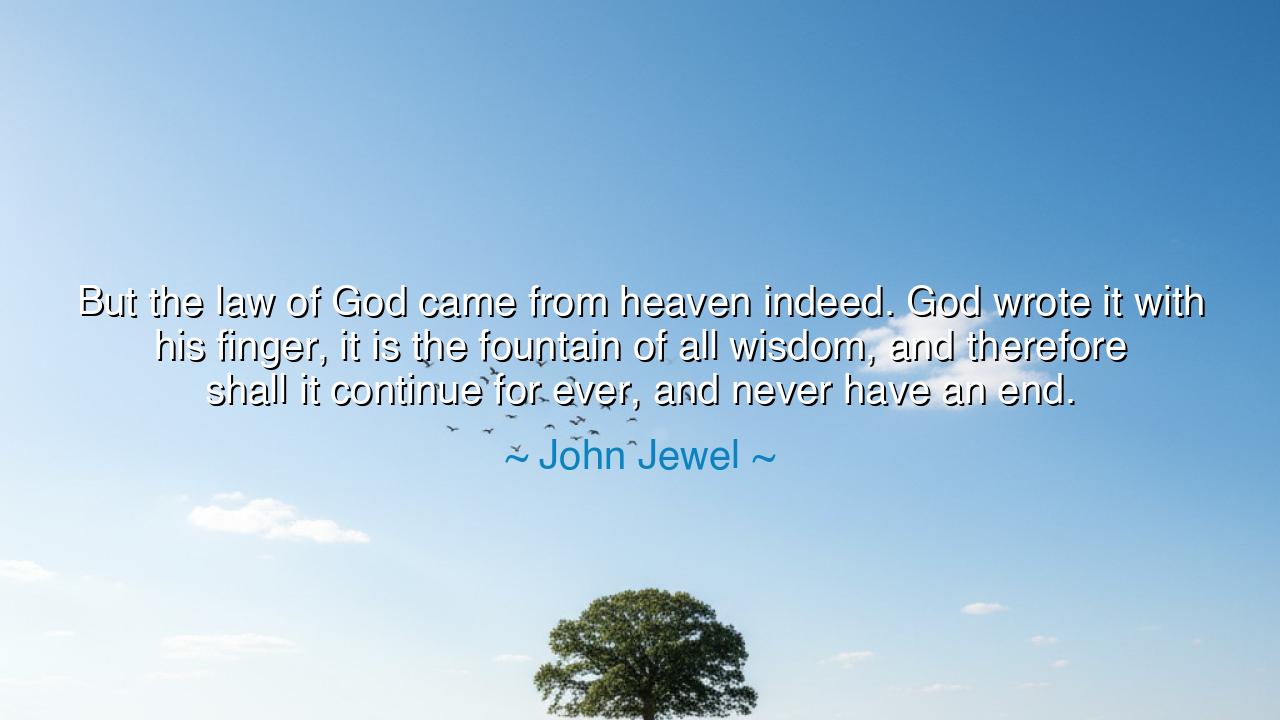
But the law of God came from heaven indeed. God wrote it with
But the law of God came from heaven indeed. God wrote it with his finger, it is the fountain of all wisdom, and therefore shall it continue for ever, and never have an end.






John Jewel, the steadfast bishop and champion of the Christian faith, declared with divine conviction: “But the law of God came from heaven indeed. God wrote it with his finger, it is the fountain of all wisdom, and therefore shall it continue forever, and never have an end.” In these words, Jewel speaks to the eternal and sacred nature of God’s law, affirming that it is not of human origin, nor subject to the whims of time or place. God’s law, inscribed by the divine hand, is not simply a set of rules, but the very fountain of wisdom itself, offering guidance that transcends generations and remains unchanging, everlasting, and incorruptible.
The meaning is profound and filled with strength. God’s law, which Jewel speaks of, is not a fleeting human construct but a divine commandment rooted in eternal truth. While the laws of men are born from human reasoning and often shift with the tides of culture and power, the law of God is a constant, a beacon that does not flicker or fade with time. Written not by the hand of any mortal king or ruler, but by the very finger of God, it carries with it the weight of divine authority and wisdom, and its truth is eternal, never to be diminished by the passage of centuries.
History bears witness to the divine law’s enduring power. Consider the Ten Commandments, revealed to Moses atop Mount Sinai, inscribed by God upon stone tablets. These commandments, though ancient, continue to serve as a moral compass for billions of people today. God’s law, as expressed through these teachings, is not bound by culture, but holds universal truth, guiding individuals and nations toward righteousness. In times of war, injustice, or moral decay, it has stood as a reminder of the divine order that transcends human folly. Thus, the law that came from heaven continues to shape human history, unshaken by the tumult of human ambition.
Jewel’s words also remind us that wisdom is not a mere intellectual pursuit, but a divine gift meant to guide human hearts and actions. God’s law is not just a matter of obedience, but a source of wisdom—a wisdom that can illuminate the darkest paths and guide us through the trials of life. It is a wisdom that speaks to the deepest needs of the soul, urging us toward justice, compassion, and righteousness. God’s law is the foundation upon which true wisdom rests, and it is through this divine law that we find our way, not just in this life, but in the eternal one to come.
Therefore, let the seeker of truth take heart in the eternal nature of God’s law. It is not something that changes with the whims of men, but a steady guide, a fountain that never runs dry. Jewel’s words remind us that the wisdom of God, given to us through His law, is our unshakable foundation. It is the wellspring of all true justice, the light that guides our moral compass, and the hope that sustains us through every trial. As we walk the earth, we are not alone; God’s law remains with us, eternal and powerful, written in the heavens and in our hearts.






QHhuynh quoc hung
Reading this, I feel intrigued by the tension between permanence and adaptability. The statement elevates divine law as the ultimate source of wisdom, but it makes me question how it is applied across different eras and cultures. How do societies balance the idea of timeless principles with practical realities and human diversity? Could reliance on divine law foster ethical consistency, or might it sometimes stifle innovation, dialogue, and moral reasoning in complex situations?
NDngoc nguyen dang
This quote provokes a deeper philosophical question: if wisdom is anchored in divine law, how does human experience and rational thought fit in? Can moral understanding evolve while still being faithful to an eternal law, or is wisdom solely derived from adherence to divine authority? I also wonder how individuals and societies navigate the tension between interpretation and application, and whether the claim of eternal relevance gives a sense of purpose or imposes constraints on human judgment.
HTdo thi hoa trinh
I feel both inspired and contemplative reading this. The idea that divine law is a fountain of everlasting wisdom suggests a sense of stability and guidance. But it also prompts me to ask: how do humans discern the correct interpretation of this law, given historical and contextual differences? Does claiming eternal authority risk dogmatism, or can it provide a foundation for ethical reasoning and justice that transcends temporal and societal changes?
TLTUAN LE
This statement makes me reflect on the concept of divine law as eternal and unchanging. It raises questions about how such principles interact with evolving human societies. If God’s law is the ultimate source of wisdom, how do we reconcile it with cultural, scientific, or ethical developments over time? I also wonder whether this belief encourages moral certainty or could limit critical questioning, and how different interpretations influence law, governance, and personal conduct.